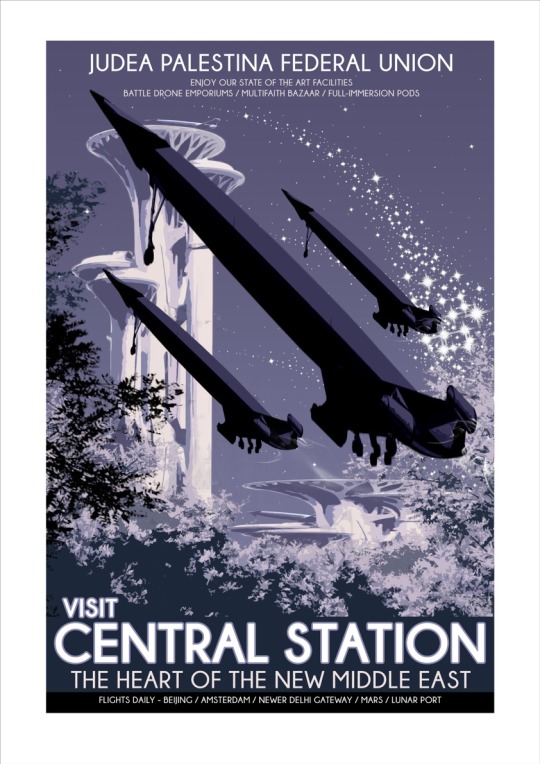CENTRAL STATION is vivid and gorgeous
The first wave of reviews for Lavie Tidhar’s forthcoming novel CENTRAL STATION have begun.

From SCI-FI AND FANTASY REVIEWS:
Central Station is at the core of the novel that bears the same name. It’s an environment that Tidhar explores exuberantly, and with what feels like a lot of informed knowledge in every line. There’s a lot going on here, at the base of the station. Rag and bone men drive horse carts alongside gleaming metal spires. There’s AI-like individuals riding the consciousness of others, for what may or may not be mutual benefit. There’s a game world so immersive you can make money doing a menial job there instead of in ‘reality’. There’s viruses that can change who and what you are, and there’s metal men, carrying the consciousness of the dead, veterans of long ago wars. It’s a lavish backdrop, and one to which the author is always adding fascinating detail. It feels like we’re looking through a window at this world, and in following our stories, there are so many others that are only visible from their edges. It’s a rich, varied world, and one which Tidhar makes convincing. I must admit to a particular fondness for the fusion of the high-tech spire of the Station with the vibrant and diverse, neighbourhood around it, that neighbourhood itself a fusion of the old and the new, of sacred traditions and sparkling novelty. Tidhar’s effort to create a cohesive universe here is a triumph, ending in a city which is recognisably human, and carries layers of strangeness and wonder around that core of familiarity. It’s a world that has been thoroughly well-realised.
The characters – well, they’re a motley crew. An oracle carrying an AI. A child who speaks to a friend who may or may not be there. A robot who performs bris. A broken mechanoid soldier in a situation of forbidden love. And a swathe of others. What Tidhard does well is to juxtapose their oddities (and some of them are very odd) with their commonalities, both with each other and the reader. There’s a psychic vampire, of sorts, who struggles to connect to people around her. A returnee from Mars, with a pulsing bi0-augmentation, who has returned to care for his sick father. The narrative celebrates the diversity of its cast, but is never afraid to ground them in, if not common humanity, then common understanding. There’s a lot of great character work here, which is fuelled in part by many of the sections being fairly introspective – we live in an individual as they go about their day to day life, and if that life is strange and wonderful to us, well, it carries the prosaic undertones of our own routines. Each of the characters heading up a section of the book has their own story to tell, and it’s to the author’s credit that I’d like to have followed them all longer, have learned more about them, and been lost in the grandeur and tiny details of their lives. The characters are, simply put, really well done.
<snip>
Is it worth reading? I’d say yes – if you’re looking for a standout, absorbing, well realised sci-fi world, with characters who feel like they’re about to stroll off the page and take you for a cup of arak. The book has a lot of great ideas, and isn’t shy of showing them off. There’s not that much in the way of stereotypical action, but there is enough conflict, tension, revelation and humanity to keep you turning pages late into the night.

Lavie manages to remain cool among all the praise.
(Photo: Kevin Nixon. © Future Publishing 2013.)
This book was a very strange experience for me. It felt as though the story was just meandering around with nothing I could point to as being a plot for most of the length, and yet it was very compelling. Then when the story events picked up, it was a mad rush to…again…sort of something? As strange as the plot and flow of the novel was, it was nevertheless very enjoyable. Definitely an experience.
<snip>
In discussing my feelings about this book with others, it was suggested that what I was describing sounded more like “classic” literature than SFF, comparisons were made to Dickens or to F. Scott Fitzgerald. And the more I think about it, the more I do sort of feel like this is more of a The Great Gatsby sort of thing. Rather than being one continuous narrative that has the ‘standard’ SFF path of rising action, climax and denouement, with a plotline that pushes the characters, CENTRAL STATION was much more…I’ll say metaphorical or maybe philosophical approach to things. More of the story is gleaned from implication and the actions of the characters than is shown to us directly, and there are hints of much deeper stories swirling around all of the characters.
I wish I’d come into it with a better understanding of what I was in for, because when you look at Central Station as a series of glimpses into the lives of the people of this world, and as hints around what’s happening in the greater scheme of this world, it’s absolutely fascinating, and incredibly well written. But between my expectations for ‘most’ SFF and the blurb implying a lot more of a traditional story, that subversion of expectations meant it took me much longer than it should have to really grab me and engage me. Because once you realise what the structure of this book is, it becomes dramatically better.
I suppose this is the benefit of a book review. Now you have a better idea of what you’re in for so you can decide whether you’d like to read it. If you’re looking for something a little more philosophical and thoughtful than the usual fare in the genre, look no further than this book. By the end, it really was a fantastic read.

★★★★
The book mostly collects previously published short stories. What this novel does is a tiny bit of editing plus smoothing out the transitions between stories and adding two unpublished stories. Those finish the central story about the quest of data vampire Carmel and alien-augmented Boris Chong just returning from Mars. The various stories meander around the quest, sometimes diverging far off, adding colour to the richly painted canvas. It is surely not a book steered by plot. The stories follow characters in their everyday life without any form of exposition, often concluding with a open ending leaving me wondering what I’ve just read.
Each individual story would get three stars from me, but the novel is more than just a combination. If you can bear a vivid, gorgeous and exotic setting, with great characters, without action or plot, then I fully recommend this book.
The book in question is a fix-up already published several stories and some unpublished, although it is true that the rewriting of many makes it almost imperceptible the different backgrounds of many of its parts. I did not realize until I saw the end of the book, he believed that the constant change of views and characters was a desired effect, an attempt to create a choral novel with different strokes. Maybe another expert on the work of the Israeli reader is able to detect just open the book.
<snip>
The very language used by the author is a combination of languages so well run that is pleasant to the ear, with a bewitching rhythm. Juggling with language, Tidhar is able to take your hat new words, as my favorite Schrodingering (I leave to you to discover what it means) or a mystical place for players called Pacmandú. Not hesitate to use words from other languages when more fit your narrative needs.
I would also like to emphasize the humor, sometimes quite black, which uses the creator. In a revised and expanded version suicide booths Futurama , you can choose how to die, one of the most popular roller coaster.
<snip>
It is quite difficult to describe a book with so many readings, so you’d better take advantage to read you and you join the conversation. You will not be disappointed.
(Translated from Spanish by Google)
For more info about CENTRAL STATION, visit the Tachyon page.
Posters by Sarah Anne Langton
